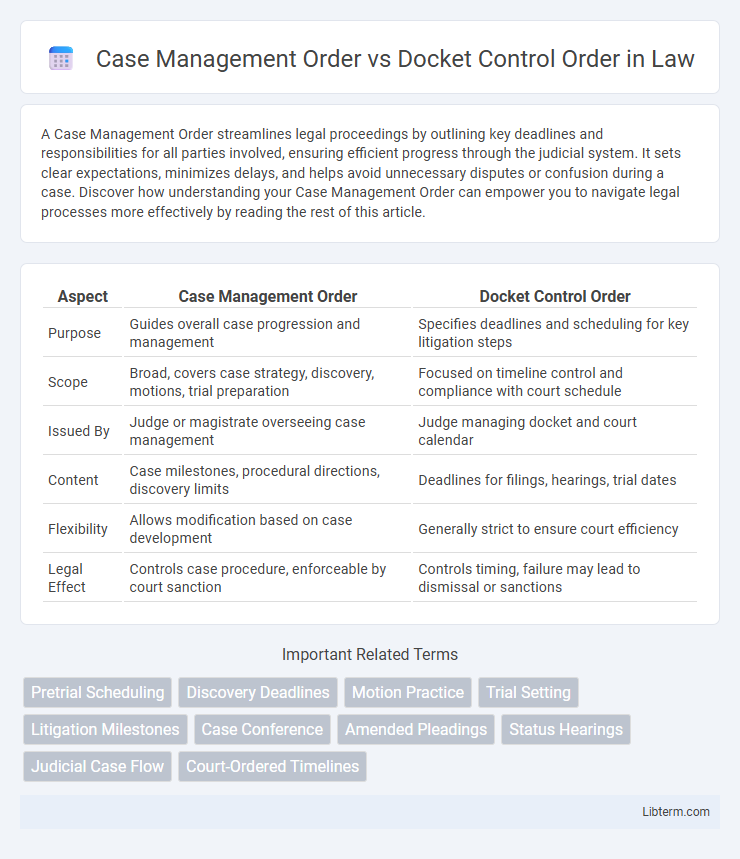A Case Management Order streamlines legal proceedings by outlining key deadlines and responsibilities for all parties involved, ensuring efficient progress through the judicial system. It sets clear expectations, minimizes delays, and helps avoid unnecessary disputes or confusion during a case. Discover how understanding your Case Management Order can empower you to navigate legal processes more effectively by reading the rest of this article.
Table of Comparison
| Aspect | Case Management Order | Docket Control Order |
|---|---|---|
| Purpose | Guides overall case progression and management | Specifies deadlines and scheduling for key litigation steps |
| Scope | Broad, covers case strategy, discovery, motions, trial preparation | Focused on timeline control and compliance with court schedule |
| Issued By | Judge or magistrate overseeing case management | Judge managing docket and court calendar |
| Content | Case milestones, procedural directions, discovery limits | Deadlines for filings, hearings, trial dates |
| Flexibility | Allows modification based on case development | Generally strict to ensure court efficiency |
| Legal Effect | Controls case procedure, enforceable by court sanction | Controls timing, failure may lead to dismissal or sanctions |
Introduction to Case Management Order and Docket Control Order
Case Management Order (CMO) is a judicial directive that outlines the timeline and procedures for managing the progression of a court case, ensuring efficient administration and adherence to deadlines. Docket Control Order (DCO) specifically regulates the scheduling of key litigation events, such as discovery deadlines and motion hearings, to maintain an organized docket. Both orders aim to streamline court processes but differ in their scope, with CMOs providing broader case management and DCOs focusing on detailed scheduling control.
Definition of Case Management Order
A Case Management Order (CMO) is a court-issued directive that outlines the schedule and procedures for managing a legal case from initiation through trial, ensuring efficient progression and resolution. It typically includes deadlines for pleadings, discovery, motions, and other pretrial activities, tailored to the specific needs and complexities of the case. Unlike a Docket Control Order, which primarily maintains the timeline for court appearances and filings, a CMO provides more comprehensive guidance on case management strategies and dispute resolution processes.
Definition of Docket Control Order
A Docket Control Order is a court directive that establishes specific deadlines and schedules to manage the progression of a case through the legal system efficiently. It outlines precise timeframes for filing pleadings, completing discovery, and setting trial dates, ensuring adherence to procedural timelines. This order contrasts with a Case Management Order, which typically encompasses broader aspects such as case status conferences and overall case coordination.
Key Purposes of Case Management Orders
Case Management Orders primarily aim to streamline litigation by setting timelines for pleadings, discovery, and pre-trial motions, ensuring efficient progress through the court system. They allocate responsibilities to parties and courts to minimize delays and promote case resolution without unnecessary hearings. These orders foster judicial oversight and coordination, reducing cost and complexity in complex civil litigation.
Main Functions of Docket Control Orders
Docket Control Orders primarily manage the timeline of litigation by setting strict deadlines for filing pleadings, discovery completion, and pre-trial motions to ensure efficient case progression. They help prevent delays by enforcing compliance with court schedules, reducing backlog, and streamlining case management. Unlike Case Management Orders, which address broader procedural issues and overall case strategy, Docket Control Orders focus specifically on controlling the chronological flow of case events.
Differences Between Case Management Order and Docket Control Order
Case Management Order (CMO) primarily outlines the procedural timeline and tasks for parties in a legal case, including discovery deadlines and motion filings, ensuring efficient case progression. In contrast, a Docket Control Order (DCO) specifically manages the court's calendar by setting strict deadlines for hearings, trials, and case events to prevent delays and backlog. While CMO emphasizes party responsibilities and case workflow, DCO focuses on court-driven scheduling to maintain docket order and judicial efficiency.
Legal Implications of Each Order
Case Management Orders (CMOs) establish procedural timelines and coordinate the progression of a case, ensuring all parties adhere to pre-set deadlines to avoid delays and sanctions. Docket Control Orders (DCOs) specifically manage court scheduling by setting firm dates for filings, hearings, and trial, directly influencing courtroom efficiency and procedural compliance. Legal implications of CMOs center on maintaining case momentum and avoiding dismissal for failure to prosecute, while DCOs emphasize strict adherence to court calendars, with violations potentially resulting in sanctions or adverse rulings.
Impact on Litigation Timelines
Case Management Orders streamline litigation timelines by setting specific deadlines for pleadings, discovery, and motions, ensuring efficient progression through the court process. Docket Control Orders further refine these timelines by enforcing strict schedules and limitations on extensions, minimizing delays and promoting timely resolution. Together, they provide critical frameworks that enhance predictability and manage the pace of litigation effectively.
Common Challenges in Implementing Each Order
Case Management Orders often face challenges such as strict adherence to deadlines and balancing comprehensive case preparation with efficient courtroom scheduling. Docket Control Orders commonly encounter difficulties in maintaining accurate and up-to-date schedules while preventing backlog and ensuring timely case progression. Both orders require effective communication among parties and robust tracking systems to mitigate delays and procedural conflicts.
Best Practices for Navigating Both Orders
Case Management Orders (CMOs) and Docket Control Orders (DCOs) serve distinct functions in litigation, with CMOs outlining the procedural framework and deadlines, while DCOs focus on scheduling trial-related events. Best practices include meticulously tracking all deadlines specified in both orders using docket management software and maintaining clear communication with opposing counsel to avoid conflicts. Proactively reviewing and seeking modifications to these orders early in the litigation process helps ensure compliance and reduces the risk of sanctions or delays.
Case Management Order Infographic

 libterm.com
libterm.com